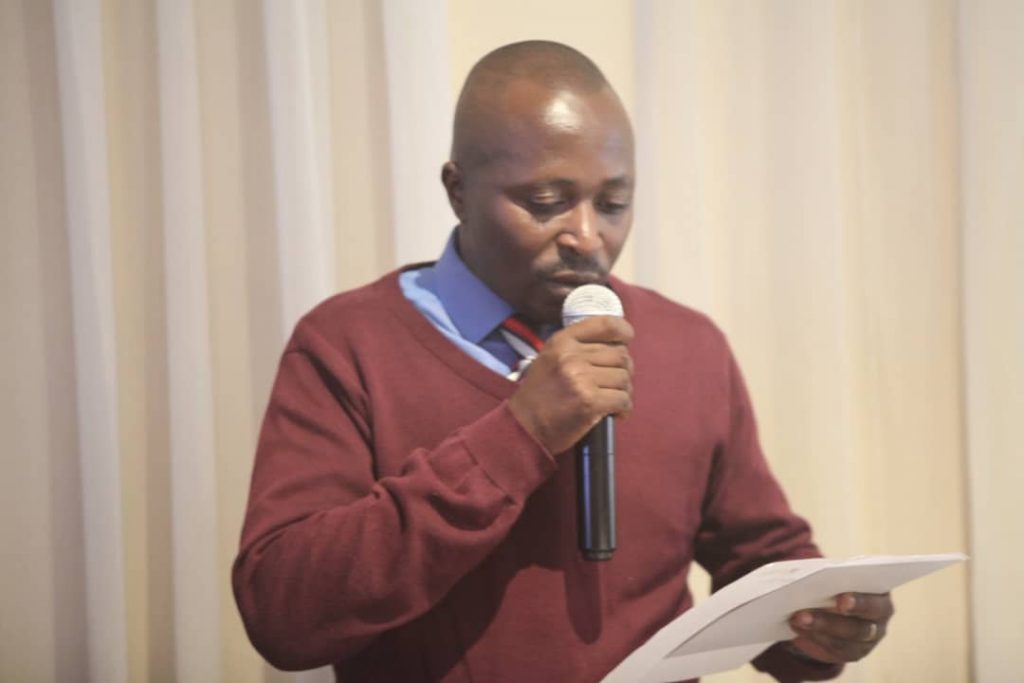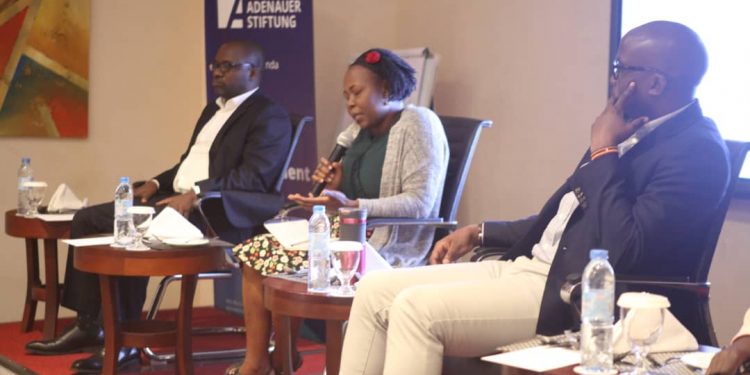The Uganda Editors’ Guild in partnership with the Media Focus on Africa (MFA), have started discussions on key issues in the media industry, including regulation and media freedoms.
At a recent dialogue held at Golden Tulip Hotel in Kampala, with support from Konrad-Adenauer-Stiftung, Dr. Adolf Mbaine, a lecturer from the Journalism School at Makerere University pointed out that the media needed to self-organize, if the industry was to present a credible case for self-regulation.
While presenting a keynote address under the topic “Creating Mechanisms towards Self-Regulation”, Dr. Mbaine, an expert on Media Regulation, presented the different options for regulation including — Statutory, Self and Co-regulation. He also expounded on the concept of self-regulation, a popular subject in the media industry circles in Uganda, pointing out its benefits and its dangers as well. His detailed presentation raised varied views on self-regulation in Uganda:
Dr. Mbaine was later joined for a panel discussion by Mr Pius Mutekani Katunzi, the Managing Director of the Observer Newspaper, Ms Barbara Among, a senior journalist and trainer and Mr. Daniel Kalinaki, the
General Manager, Editorial at the Nation Media Group.
The panel agreed that while Self-Regulation is the ideal way to regulate the media in Uganda and to achieve more independence, the current context of issues and challenges facing the media in the country suggest that the industry may not be ready to regulate itself.
“Before we think of self-regulation, we need to be organized, defined and known. Journalism is the only profession in Uganda or one of those bodies that want to be a profession that is not defined, it’s so disorganised and in a way the state and other players have taken advantage of that,” Mr Katunzi, a panelist said.
Ms. Among, a trainer and veteran editor said:
“To propose self-regulation is putting the cart before the horse. In order for self-regulation to work we need three things, maturity, civility, and respect for colleagues and the general public…. Are we ready for it? No, not at the moment!”.
Ms. Among suggested co-regulation as a better option to pursue.
Mr Kalinaki noted that the media needed to pay attention to the political economy, and other industry ethical issues which was its biggest threat at the moment.
Mr. Kalinaki, who is also the Interim Chairman of the Uganda Editor’s Guild unveiled considerations for working together through the senior editors to tackle media issues, and influence policy.
“We need to find our own home grown solutions. I agree generally that we are not ready for self-regulation but not that we are not ready to develop a self-regulation mechanism. This is probably one of the few times where you have editors sitting in a room to have a conversation about the industry, this in itself revolutionary and commendable,” he said.
Mr Kalinaki noted that working together as editors would help to respond to some of the issues affecting the media in the country, noting that often, the editors’ roles or contributions are either left out in existing media associations like Uganda Journalist’s Association or Uganda Media Owners Association among others.
Alex B. Atuhaire, the Editorial Director of online platform www.pmldaily.com (PML Daily), who moderated the event pointed that while there is a consensus that it is not yet time for self- regulation, there is need for the media to be more organized to work closely in order to achieve its goals and protect its interests.
The Uganda Editors’ Guild, not in its interim period is expected to be officially launched by World Press Freedom Day on May 3, 2020.
The Editors’ Guild, partnered with the Media Focus on Africa to organize the dialogue as one of a series of activities building up to the Uganda Media Week that will take place later in the year.

According to Ms Jan Ajwang Programme Manager, Media Focus on Africa, The National Media Week- seeks to bring different stakeholders, like the media, academia, civil society, government representatives to a consensus about key challenges facing the media and to agree on realistic and practical solutions to address them. Through the dialogues a specific topic is identified and extensively discussed as participants regardless of their different views on the matter work towards identifying the real problems and agreeing on the most viable ways forward to address them.
“Over the past few months we have been having conversations with different people who share a common goal or obligation to advance the rights and freedoms of the media in Uganda. Across the board, some issues continue to stand out like the digital disruption that has led to increase in disinformation, the current media regulatory environment, considerations for more sustainable business model for journalism among others,” she said.
According to Donnas Ojok- Programme Manager, Konrad Adenuer Stiftung (KAS), KAS has been supporting various media initiatives in Uganda for many years. However, recently focusing on non- traditional media like Social Media. ‘We have often found that Social Media doesn’t exist independent of the mainstream and traditional media and find the need to continue supporting mainstream media,@ he said.
According to Ms Ajwang, more dialogues will be held ahead of the National Media Week. A previous dialogue on Fake News and Disinformation – was recently held with participants agreeing that media house must pay more attention to verification of sources- especially for online sources, fact checking above the rush to be the first to publish.





